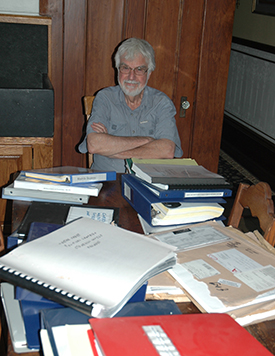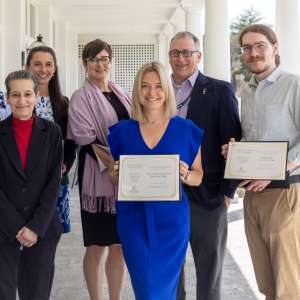Keene State’s Critical Role behind Ken Burns’ Defying the Nazis

The powerful story of Waitstill and Martha Sharp – a Unitarian minister and his wife from Wellesley, Massachusetts, who left their safe life of comfort to spend two dangerous years helping hundreds of political dissidents and Jewish refugees flee the Nazis at the beginning of World War II – would be missing much of its rich detail were it not for the years of dogged research by a group of Keene State faculty who realized the importance of the Sharp’s work.
That research uncovered a wealth of material that co-directors Ken Burns and Artemis Joukowsky drew upon for their new documentary, Defying the Nazis: The Sharps’ War, that aired on September 20 on PBS. Told through the Sharps’ letters and journals, the film features Tom Hanks as the voice of Waitstill and Marina Goldman as the voice of Martha Sharp. “Much of the powerful, detailed storytelling in Defying the Nazis is a direct result of the scholarship and research skills of Keene State College professors Larry Benaquist, Tom Durnford, Paul Vincent, and Bill Sullivan, and to the College’s grants that made their work possible,” Ken Burns noted.
Begin pull-quote…Ken Burns and Artemis Joukowsky will be at the Colonial Theater in downtown Keene on Wednesday, Oct. 26, at 7:30 p.m. to show and discuss Defying the Nazis. Artemis Joukowsky will also be at the Colonial for a 9:15 a.m. screening for student groups and the public. Both showings are free and open to the public. …end pull-quote
Unravelling the story began back in 1999 when Professor of American Studies Bill Sullivan (now professor emeritus) stumbled upon Martha Sharp’s obituary shortly after he and Film Studies Professor Larry Benaquist (also now professor emeritus) finished work on their documentary, Here Am I, Send Me: The Journey of Jonathan Daniels, about the Keene native and civil rights activist who was killed in Alabama in 1965 while saving the life of a young black girl. Both professors realized that the Sharps, like Jonathan Daniels, were unsung heroes whose remarkable story deserved to be told.
Their research led them to Artemis Joukowsky, the Sharps’ grandson, who was committed to bringing his grandparent’s story to light. He turned over several boxes containing hundreds of Martha Sharp’s letters, journals, and papers, and Sullivan and Benaquist spent countless hours reading, cataloguing, and indexing this treasure trove of information. Those materials are now at the United States Holocaust Memorial Museum in Washington, DC, where officials told Dr. Benaquist that his careful cataloguing saved the museum tens of thousands of dollars.
Righteous among the Nations
Aided by funding from the Joukowsky Family Foundation, Keene State faculty research grants, and Keene State supporters Rick and Jan Cohen, Benaquist and Sullivan scoured archives around the country and made several trips to Europe to visit places the Sharps had lived during the war. They enlisted the help of Professor of Modern Languages and Cultures Tom Durnford to help them translate documents they uncovered in Pau, a city in southwestern France where the Sharps saved many children and refugees, earning them the suspicion of Nazi and Vichy officials.
As he delved into the information uncovered in Pau, Durnford realized that the Sharps would be good candidates for Israel’s Righteous among the Nations award, which honors non-Jews who put themselves at risk helping Jews escape the Holocaust. With help from Professor and Chair of Holocaust and Genocide Studies Paul Vincent to craft the demanding nomination correctly, Joukowsky and the Keene State team were able to secure this prestigious award for the Sharps, making them two of only five Americans to receive the distinction.
“Producing Defying the Nazis would not have been possible were it not for the tireless work and years of research of Keene State professors Larry Benaquist, Bill Sullivan, Tom Durnford, and Paul Vincent,” Joukowsky explained. “They became personally involved in uncovering my grandparents’ powerful story and were critical in having Martha and Waitstill Sharp awarded Yad Veshem’s ‘Righteous among the Nations.’”
The Sharp’s story continues to reflect today’s stories of refugees and those who stand up to help them escape violent homelands. “To me, the Sharps signify the finest traits of humanity,” Bill Sullivan said. “When faced with the specter of inconceivable cruelty and injustice, they put their lives, their comfortable existence, and their family ties in jeopardy. Our research revealed their bravery and insistence on helping so many escape and find a safe haven. In addition, reading the files of desperate asylum seekers who needed help and assistance is so relevant to today’s refugee situations. Hopefully, the Sharps will serve as models of what it means to be humane in the face of unspeakable evil.”





